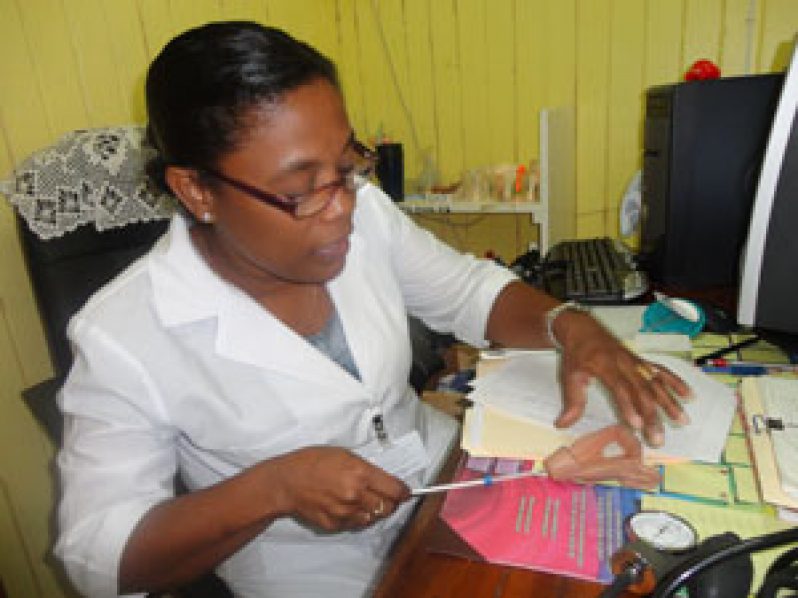THE flexible plastic ‘T’ being guided into an artificial vagina is a much less threatening device when Clinic Nurse Audrey Morris is doing the guiding. An IUD (Intrauterine device) has always appeared to me to be a terrifying contraceptive device. Will it cause pain and infection? What if it becomes imbedded? Are the stories I heard of babies being born clutching an IUD true or fanciful tales?
 Morris demonstrates that the IUD is actually a tiny flexible object that is applied with an applicator resembling a narrow plastic straw through the mouth of the cervix, which is very soft. It can actually be removed at any time, since a string is left hanging out of the cervix in the vaginal canal.
Morris demonstrates that the IUD is actually a tiny flexible object that is applied with an applicator resembling a narrow plastic straw through the mouth of the cervix, which is very soft. It can actually be removed at any time, since a string is left hanging out of the cervix in the vaginal canal.
Hers are doubtless skilled hands. Working in the field of nursing for over 30 years, and at the Guyana Responsible Parenthood Association (GRPA) at 70 Quamina Street, South Cummingsburg, Georgetown for the last eight, Morris has a passion for her occupation. She chose this field so she could help people make informed choices about contraceptive use.
Herself a mother of three, her pleasant personality helps to alleviate the nervousness of her clientele. Counselling and giving customised advice is an essential component of her job.
After all, there are many types of birth control, and all is not suited for everyone. So, more often than not, Ms. Morris needs to help a client find the birth control method that is right for the client.
She advises women to put themselves first. “We women make plans to go to the doctor, and when something happens to our child, we say that we will go tomorrow and end up not going. We don’t put ourselves first”.
This advice is not selfish, but can best be explained as the oxygen mask theory. “When the flight attendants say, ‘Place your oxygen mask on first and then assist others,’ they are sharing some wisdom. The reason you need to put your mask on first is so that you are still alive to help others. If, instead, you are busy helping others first, and die from lack of oxygen, your efforts to be helpful would have been worthless, and your death would have been in vain”, she reasoned.
Morris advises all women to have their breasts examined, and have their vaccines up-to-date. She notes that a significant number of women have been visiting the GRPA with some abnormal pap smears, and that some persons wait until they reach an advance stage in the condition before seeking help.
For a very low price, a woman can have a complete gynaecological examination, which includes examination of the breasts, checking for discharges and abnormalities in the vulva and cervix.
She advises that if a woman needs to go to the bathroom, she should do so as soon as possible, because many working women often wait to complete tasks and then have to relieve themselves in a rush. This practice can contribute to urinary tract infections.
Among the services offered by the GRPA are gynecological care; pap smear tests; provision of contraceptives; breast, pelvic, prostate and testicular examination; terminations of pregnancy; infertility management; treatment of menopausal syndrome; HIV and STI testing and treatment; and a host of other services.
Additionally, the GRPA offers family, marriage and HIV counseling services.
A non-governmental organization (NGO), the GRPA was established in 1973 as an educational training and family planning institution. In 1995, the Association expanded its scope and developed a more holistic approach to sexual and reproductive health. GRPA is now a leading NGO in the area of holistic sexual and reproductive health and chronic diseases, providing optimum services in a safe and comfortable environment, where people are supported to live healthy and productive lives.
The main objective of the GRPA is to develop high quality, sustainable services and programmes specifically in the area of sexual and reproductive health.
In 2011, GRPA delivered nearly 174,000 condoms and 56,000 sexual and reproductive health services. It provided an additional 12,000 HIV-related services, and 14,000 services were provided to young people below the age of 25 years.
GRPA is an associate member of the International Planned Parenthood Federation (IPPF), Western Hemispheric Region (WHR), and an associate member of the Caribbean Family Planning Affiliation Ltd (CFPA). Partners in Guyana include UNFPA, Ministry of Health, Ministry of Human Services and Social Security, and the National Aids Programme Secretariat (NAPS).



.jpg)








